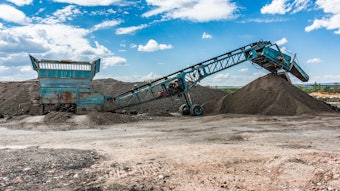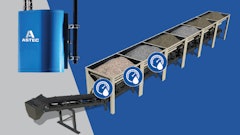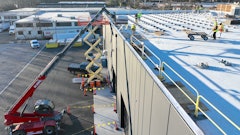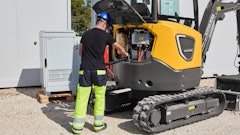
While this product is currently not available in the United States, the process and the materials are newsworthy. Hopefully, they will make there way to the United States (US) road building industry in the not-too-distant future, as both the United Kingdom (UK) and the US asphalt industries are aiming for carbon neutrality by 2050. This type of innovative product, achieved at scale, could go a long way to that end.
It's important to understand that the carbon neutrality of the Foamix Eco solution, which is an iterative step forward from the already highly sustainable Foamix product, does not achieve its status by itself. According to Aggregate Industries' website, "Foamix is designed to incorporate up to 92% recycled materials, ensuring a high level of environmental responsibility in its production and application."
The leap to Foamix Eco achieves carbon neutral status by incorporating two other products in the process. Through a close collaboration with partners Nynas, which provided a biogenic based bitumen, and OCO Technology, who use an unique carbon capture and utilization process (CCU) to produce a carbon negative aggregate; Aggregate Industries created the new Eco product which is less reliant on virgin aggregates and consumes less energy due to its cold-lay production process.
Foamix Eco can be manufactured and laid on-site, where mobile mixing plants, nearby batch plants, or cold in-place recyclers can reprocess the existing road from its millings, significantly reducing the roadway's carbon footprint. Additionally, Foamix Eco can be laid in a single six inch lift without any specialized labor or process, which, while single lifts that depth aren't common in the US, is still impressive.
Plus, when using onsite recycling and working closely with their supply chain, contractors can achieve carbon neutrality across stages A1 - A5 of the life cycle. A huge step forward for the industry incorporating both the product and construction stages.
Thomas Edgcumbe, Managing Director for Surfacing Solutions at Aggregate Industries, said: "After rigorous research and development, coupled with live manufacturing and installation trials in partnership with Lancashire County Council, the new carbon neutral Foamix Eco is the most sustainable and lowest carbon asphalt construction material to date, and we are delighted to be launching it to market.
What Makes It All Work
The marriage of all three produces an environmentally sustainable surface material, that remains able to meet the performance demands and industry standards under the UK's highways specification requirements.
Nynas' biogenic based bitumen is a polymer-modified bitumen that includes a biogenic component. From a press release dated in 2022, posted to Nyan's website, “By adding polymers, you can further extend the service life of a road,” says Jenny-Ann Östlund, Nynas Bitumen Technology Manager. ”One downside is that a PMB in itself has a larger climate impact due to the relatively large contribution of the polymers to its carbon footprint. This is in a way compensated by the longer service life.”
To reduce the climate impact even further, Nynas has developed the Nypol RE range – PMBs that contain material with biogenic carbon, which compensates for the increased footprint from polymers without affecting the extended service life that they provide.
“Viewed over a life cycle perspective, that’s the whole service life of the product, this results in a significantly reduced climate impact,” confirms Jenny-Ann Östlund.
The advanced carbon capture technique used for Foamix Eco almost sound like something out of science fiction. OCO Technology creates carbon negative aggregates from waste, water, and captured carbon dioxide. The captured carbonates are transported to a specialized production facility, where they are combined in a highly controlled environment with reactive wastes. What, in nature, takes month or even years, through Accelerated Carbonation Technology (ACT), the process takes only minutes.
 Taken from OCO Technology's official website
Taken from OCO Technology's official website
The results is calcium carbonate, a solid granular substance that is then applicable for several key construction uses. In the case of asphalt, it is, according to the company's website, "blended with binders and fillers and then pelletized to form a rounded aggregate (M-LS or Manufactured-LimeStone)."
A road paved with this blend of products and technologies is a potential model for a true circular ecological economy, where every aspect of the construction, production, and materials are all re-used and recycled.
In the US, a similar process is being used by Blue Planet, which boldly claims that by using its patented system, "If we replace[d] just 16% of all aggregate used today with Blue Planet Aggregate, we could achieve the CO2 storage needed by 2050 to keep temperature rise below."

![Img 1707[56]](https://img.forconstructionpros.com/files/base/acbm/fcp/image/2023/04/IMG_1707_56_.6437076c97961.png?auto=format%2Ccompress&fit=crop&h=191&q=70&rect=0%2C462%2C1920%2C1080&w=340)
















![Glp Porsche 072723 465 64ee42287c29e[1]](https://img.forconstructionpros.com/files/base/acbm/fcp/image/2024/03/GLP_PORSCHE_072723_465.64ee42287c29e_1_.65e88b8589b9c.png?auto=format%2Ccompress&fit=crop&h=135&q=70&rect=0%2C520%2C2250%2C1266&w=240)







